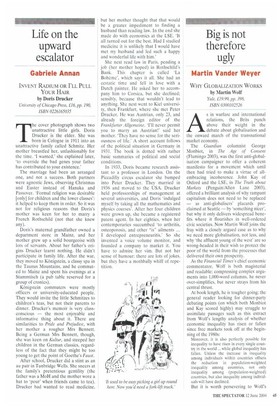Life on the upward escalator
Gabriele Annan
INVENT RADIUM OR I'LL PULL YOUR HAIR by Doris Drucker University of Chicago Press, £16, pp. 190, ISBN 0226165035 The cover photograph shows two unattractive little girls. Doris Drucker is the elder. She was born in Cologne in 1911 into an unattractive family called Schmitz. Her mother breastfed her, unfashionably for the time. `I wanted,' she explained later, `to override the bad genes your father has contributed to your existence.'
The marriage had been an arranged one, and not a success. Both partners were agnostic Jews, observing Christmas and Easter instead of Hanuka and Passover. 'Formal religion was desirable [only] for children and the lower classes': it helped to keep them in order. So it was not for religious reasons that Doris's mother was keen for her to marry a French Rothschild (not that she knew any).
Doris's maternal grandfather owned a department store in Mainz, and her mother grew up a solid bourgeoise with lots of servants. About her father's origins Drucker learnt nothing. He didn't participate in family life, After the war, they moved to KOnigstein, a classy spa in the Taunus Mountains, and he commuted to Mainz and spent his evenings at a Starnmtisch (a pub table reserved for a group of cronies).
Konigstein commuters were mostly officers or university-educated people. They would invite the little Schmitzes to children's teas, but not their parents to dinner. Drucker's memoir is very classconscious — the most enjoyable and informative thing about it. There are similarities to Pride and Prejudice, with her mother a rougher Mrs Bennett. Being a German Mrs Bennett, though, she was keen on Kultur, and steeped her children in the German classics, regardless of the fact that they might be too young to get the point of Goethe's Faust.
After school, Drucker did a stint as an au pair in Tunbridge Wells, She sneers at the family's pretentious gentility (the father was a MoH and the mother wore a hat to 'pour' when friends came to tea). Drucker had wanted to read medicine, but her mother thought that that would be a greater impediment to finding a husband than reading law. In the end she made do with economics at the LSE. `It all turned out for the best. Had I studied medicine it is unlikely that I would have met my husband and led such a happy and wonderful life with him.'
She next read law in Paris, pending a job (her mother hoped) in Rothschild's Bank. This chapter is called `La Boheme', which says it all. She had an ecstatic time and fell in love with a Dutch painter. He asked her to accompany him to Corsica, but she declined; sensibly, because that wouldn't lead to anything. She next went to Kiel university, then Frankfurt, where she met Peter Drucker. He was Austrian, only 23, and already the foreign editor of the Frankfurter Allgemeine. 'I'll never permit you to marry an Austrian!' said her mother. 'They have no sense for the seriousness of life.' A short account follows of the political situation in Germany in 1931. The book is dotted with rather basic summaries of political and social conditions.
In 1933, Doris became research assistant to a professor in London. On the Piccadilly circus escalator she bumped into Peter Drucker. They married in 1936 and moved to the USA. Drucker held professorships of management at several universities, and Doris 'indulged myself by taking all the mathematics and physics courses'. After her four children were grown up, she became a registered patent agent. In her eighties, when her contemporaries succumbed 'to arthritis, osteoporosis, and other "is" ailments ... I developed entrepreneuritis.' So she invented a voice volume monitor, and founded a company to market it. You have to admire her vim. But not her sense of humour: there are lots of jokes, but they have a mothbally whiff of repetition.


















































































 Previous page
Previous page